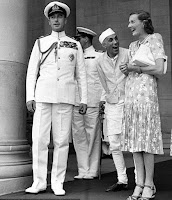 |
Mountbatten, Nehru, and Edwina |
“Nehru was the perfect replica of a certain type of Englishman. He often used the expression 'continental people', with an amused and sarcastic manner, to designate French or Italians. He despised non-anglicized Indians and had a very superficial and partial knowledge of India. His ideal was the romantic socialism of 19th century Britain. But this type of socialism was totally unfit to India, where there was no class struggle and where the conditions were totally different from 19th century Europe.”
Daniélou points out that in India, “socialism was devoid of meaning,” because this country did not have a history of class struggle, and the social conditions here were vastly different from that in Europe. The imposition of Nehruvian socialism, which was essentially British Fabian socialism, ensured India’s political and economic backwardness. On page 348, Daniélou reflects on Nehru’s failure, after India's independence, to reform the British colonial laws and institutions to make them compatible with India’s Hindu culture:
"The Hindus who had mostly supported the Congress in its fight for independence, had thought that the modernist ideology of an Anglo- Saxon inspiration of its leaders was only a political weapon destined to justify independence in the eyes of Westerners. They thought that once independence was acquired, the Congress would revise its policies and would re-establish proper respect towards Sanskrit culture, Hindu religious and social institutions, which form the basis of Indian civilization. But nothing doing, the minority formed by the Congress leaders was too anglicized, to reconsider the value of what they had learnt. Few things changed in Indian administration, only the color of the skin of the new rulers, who were most of the time lower ranks officials of the old regime.”
The promotion of socialist (communist) and Islamic values, at the cost of Hindu interests, was the dominant feature of the secular and socialist system that Nehru imposed on India. During his rule, Hindu-bashing became a popular pastime for India’s powerful politicians and intellectuals.
1 comment:
Brahmins, Anoop, Brahmins.
To truly understand a country or a people --- in all its/their glory, achievements, weaknesses, and actual utter failings --- you have to first and foremost understand their dominant ideas, and to do that, you have to understand their dominant intellectuals. (That remains true even if someone fondly though falsely believes that the "belt" runs in the opposite direction --- from the layman to the intellectuals.)
To truly understand India and Indians --- in all its/their glory, achievements, weaknesses, and actual utter failings too --- you have to first and foremost understand the caste system and the caste-Brahmin [India's actual intellectual, with a minority among them also being non-casteists].
Once you do that, you also understand why I am [or have been made into] a career failure, BTW.
I sincerely believe the above. Yes, of course, one can be wrong in utter sincerity too. But still, those who don't believe the above have to present a good argument as to how I am wrong. Not just be exasperated, or too analytical, or too clerical, or too scholarly, or too hideous. A good argument by itself would be enough.
Attacking the West, in particular the Brits, doesn't always work as a smokescreen, Anoop, to explain why India has done so badly (wherever it has). The Brahmin has to be examined too, actually much more closely, for his being far too close to India, and actually having been shaping the actual Indian condition for 10,000+ years. (Some say 100,000+ years) That's the bottomline.
But of course, you are free to say that it always has been the people who truly have shaped the poor Brahmin; the Brahmin had nothing to do except to pursue the en-nobling of his own soul --- and may be of other few. If you argue that way, I won't take my argument further with you!
Talking of the present scene: A lot of rich Brahmins abroad (esp. in USA, UK --- the West) supply a lot of money to many people through various channels too. [If I were to get any such, I would openly acknowledge it. May be that's why *I* don't get any of it. In fact went jobless for 10+ years. With my talent, hard-work, and also actual achievements. [The practical Brahmin flourishes best in the mixed economy and authoritarinism. One hasn't seen him in action in actual free economy. The closest parallel is to science research, esp. that in foundational sciences. But on that count, I won't talk much. [LOL! Yes, I do live in Pune. Even then. LOL!]]] Besides making a great deal of money, they also observe things like the the Hindu Persecution Day/Month/Year/Decade/Century/Millenium/Millenia/whatever. [In my limited experience, I haven't seen a Brahmin thinking of proposing the Hindu Persecution of Lakh/Crore of Years, though.]
Best,
--Ajit
Post a Comment